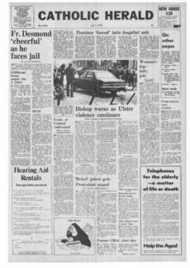Page 6, 7th July 1972
Page 6

Report an error
Noticed an error on this page?If you've noticed an error in this article please click here to report it.
Tags
Share
Related articles
Donald Davie's New Oxford Book Of Christian Verse Came Out
Full Flood,
Permanent Anthology
John Cornwell A Thief In The Night (penguin, £4.99 416
Poetry
Religion in poetry
The Faber Book of Religious Verse by Dame Helen Gardner (Faber £3.75)
AS her guiding-line to this magnificent anthology, The Faber Book of Religious Verse, Dame Helen Gardner adapts the Oxford Dictionary's definition of the w or d "religion"; this is part of it "recognition on the part of mart of some unseen power having control of his destiny, and as being entitled to obedience, reverence, and worship . .."
By regarding "commitment or obligation" as of unique importance, the anthologist "arrived at the criterion that a religious poem was a poem concerned in some way with revelation and with man's response to it."
Dame Helen admits that religious poetry need n o t necessarily be Christian poetry, even though most of her choices are, in fact, Christian poems; but she admits Blake, Yeats and Emily Bronte into her canon, though she rightly does not include Eastern religious verse. To attempt that would have made her task quite impossible.
The result of this scholarly and imaginative starting-point is a collection of wonderful poems, dating from translations from the Anglo-Saxon to poems by living poets. A number of expected pieces are rightly here, but there are also some very happy surprises.
Under her definition, this anthologist is able to include poets who doubted Christianity, such as D. H. Lawrence and Thomas Hardy.
She has, expectedly, chosen well but has not overrepresented the poets of her own especial period, the seventeenth century; the choices from Vaughan and Herbert could hardly be surpassed in the space available.
Poems From Bangla Desh: The Voice of a New Nation (translated by Pretish Nandy and selected by Tambimuttu Lyrebird Press £1.25 paperback, £2 hardback) presents work by 35 poets from East Bengal.
Many subjects are explored and there is, as we might expect, much suffering written of but without self-pity. I think the most rending and beautiful of all these poems is Hasan Hafizur Rahman's "The Immortal 21st February" which ends: "0 mother what is it you desire."
Here is religion in Dame Helen Gardner's sense and it comes today from the East.
Elizabeth Jennings
blog comments powered by Disqus









